In recent years, the contact grill market has seen a surge in popularity, particularly in Europe and North America. As consumer preferences evolve and technology advances, private label contact grills have emerged as a significant force within the industry. This segment of the market is not only gaining traction but also reshaping the competitive landscape. Understanding the factors driving demand, the key features of these grills, and the strategies employed by both major brands and private label manufacturers is crucial for anyone looking to navigate this dynamic sector. Moreover, examining consumer preferences and market feedback, as well as the technological innovations and challenges faced by private label producers, will provide valuable insights into the future outlook for this niche within the larger kitchen appliance industry.
Introduction to Contact Grill Market Trends
The contact grill market has experienced a significant surge in popularity, particularly in Europe and North America. These regions have seen a notable shift in consumer preferences, with an increasing demand for convenient and efficient cooking appliances. This article delves into the current market trends and the evolving dynamics of the contact grill industry.
Contact grills, also known as flat-top grills or countertop grills, have become a staple in many kitchens due to their versatility and ease of use. These compact appliances are designed to mimic the outdoor grilling experience indoors, allowing for the searing and locking-in of flavors that are characteristic of traditional grilling.
One of the most prominent trends in the contact grill market is the growing preference for healthier cooking methods. As consumers become more health-conscious, they are seeking cooking appliances that can offer a healthier alternative to traditional frying or cooking methods. Contact grills, with their ability to cook with less oil, align perfectly with this trend.
The demand for private label contact grills has also been on the rise. Private labeling allows manufacturers to offer branded products at a lower cost, making them an attractive option for budget-conscious consumers. In Europe and North America, private label contact grills have gained traction due to their affordability and quality.
In Europe, the contact grill market is witnessing a surge in sales, driven by the popularity of outdoor dining and the desire for convenience. The market is highly segmented, with various product types, such as dual-zone grills, infrared grills, and electric grills, catering to diverse consumer needs. The trend towards smart technology has also influenced the market, with a growing number of contact grills featuring digital controls and programmable settings.
Similarly, in North America, the contact grill market is experiencing robust growth. The region’s culinary culture, which emphasizes bold flavors and the use of spices, has contributed to the popularity of contact grills. Consumers are drawn to the ability to achieve a perfect sear and the convenience of cooking a variety of dishes on a single appliance.
One of the key factors driving the demand for contact grills is their versatility. These appliances can be used to cook a wide range of foods, from steaks and burgers to vegetables and seafood. The even heating and precise temperature control provided by contact grills ensure that the food is cooked to perfection.
Another important trend in the contact grill market is the focus on sustainability. As consumers become more environmentally conscious, there is a growing preference for appliances that are energy-efficient and have a lower carbon footprint. Contact grills, which can be powered by electricity or gas, offer a greener alternative to traditional grills and open flames.
The design of contact grills has also evolved to cater to modern kitchen aesthetics. Manufacturers are now offering sleek, stylish designs that complement contemporary kitchen decor. The inclusion of features such as non-stick surfaces, removable drip pans, and easy-to-clean components has further enhanced the appeal of these appliances.
The competitive landscape of the contact grill market is diverse, with both established brands and private label manufacturers vying for market share. Major brands are investing in research and development to introduce new features and technologies, while private label manufacturers are focusing on cost-effectiveness and value-added services to attract consumers.
In conclusion, the contact grill market is experiencing a dynamic phase, with a growing emphasis on health, convenience, sustainability, and design. As consumer preferences continue to evolve, the market is expected to see further innovation and growth in the coming years.
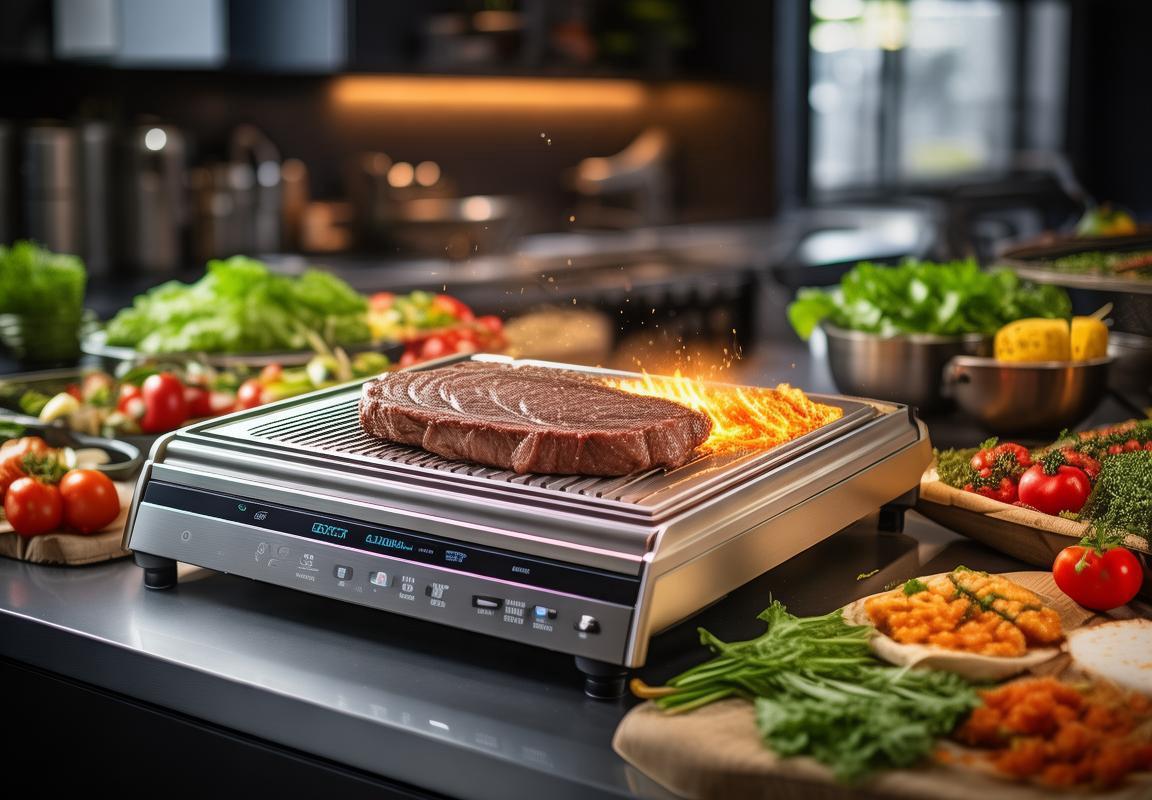
The Rise of Private Label Contact Grills in Europe and North America
The European and North American markets have witnessed a significant surge in the popularity of private label contact grills. This trend has been fueled by a variety of factors, including shifting consumer preferences, the growth of e-commerce, and the desire for unique, yet cost-effective kitchen appliances.
One of the primary reasons for the rise of private label contact grills in these regions is the increasing demand for health-conscious cooking options. With a growing number of consumers opting for healthier lifestyles, there’s a heightened interest in cooking methods that reduce oil usage and minimize smoke. Private label brands have capitalized on this by offering contact grills that provide a quick, efficient, and healthier way to cook meats, vegetables, and even sandwiches.
Another factor contributing to the growth of private label contact grills is the convenience they offer. These compact appliances are designed for ease of use, allowing for even cooking and easy cleanup. As consumers continue to seek out appliances that save time and effort in the kitchen, private label brands have positioned their contact grills as a practical choice for busy households.
The expansion of e-commerce platforms has also played a crucial role in the popularity of private label contact grills. Online retailers have made it easier for consumers to discover and purchase these products, often at competitive prices. This accessibility has expanded the market reach, allowing private label brands to compete with well-known national and international brands.
Moreover, the customization opportunities offered by private label manufacturers have attracted both retailers and consumers. Retailers can have their branding and specific features integrated into the contact grills, creating a unique product that stands out on shelves. For consumers, this means a wider variety of options that cater to their personal preferences and needs.
In Europe, the trend towards private label contact grills has been particularly strong. Countries like Germany, the UK, and France have seen a surge in sales, driven by a combination of factors including the preference for home-cooked meals, the popularity of outdoor cooking during the warmer months, and the rise of health food markets. Private label brands have been able to leverage these trends by offering a range of contact grills that cater to different cooking styles and dietary requirements.
Similarly, in North America, the market for private label contact grills has expanded. The U.S. and Canada have a strong tradition of barbecue, and the contact grill has become a staple for many households. Private label brands have been able to tap into this market by offering grills that are not only suitable for traditional barbecue recipes but also for innovative cooking techniques like reverse searing and indirect cooking.
The design and functionality of private label contact grills have also evolved to meet the demands of the modern consumer. Features such as adjustable temperature settings, removable drip pans for easy cleanup, and non-stick surfaces have become standard in many private label models. These enhancements have not only improved the cooking experience but have also made the appliances more attractive to consumers looking for quality and convenience.
Despite the growth, private label contact grill manufacturers face challenges. They must compete with established brands that have strong market presence and brand loyalty. Additionally, maintaining consistent quality and ensuring compliance with safety standards is crucial for long-term success.
Looking ahead, the future of private label contact grills in Europe and North America appears bright. As consumer trends continue to favor health, convenience, and customization, private label brands are well-positioned to capitalize on these opportunities. The key will be innovation and the ability to adapt to changing market dynamics, ensuring that private label contact grills remain a preferred choice for many consumers.
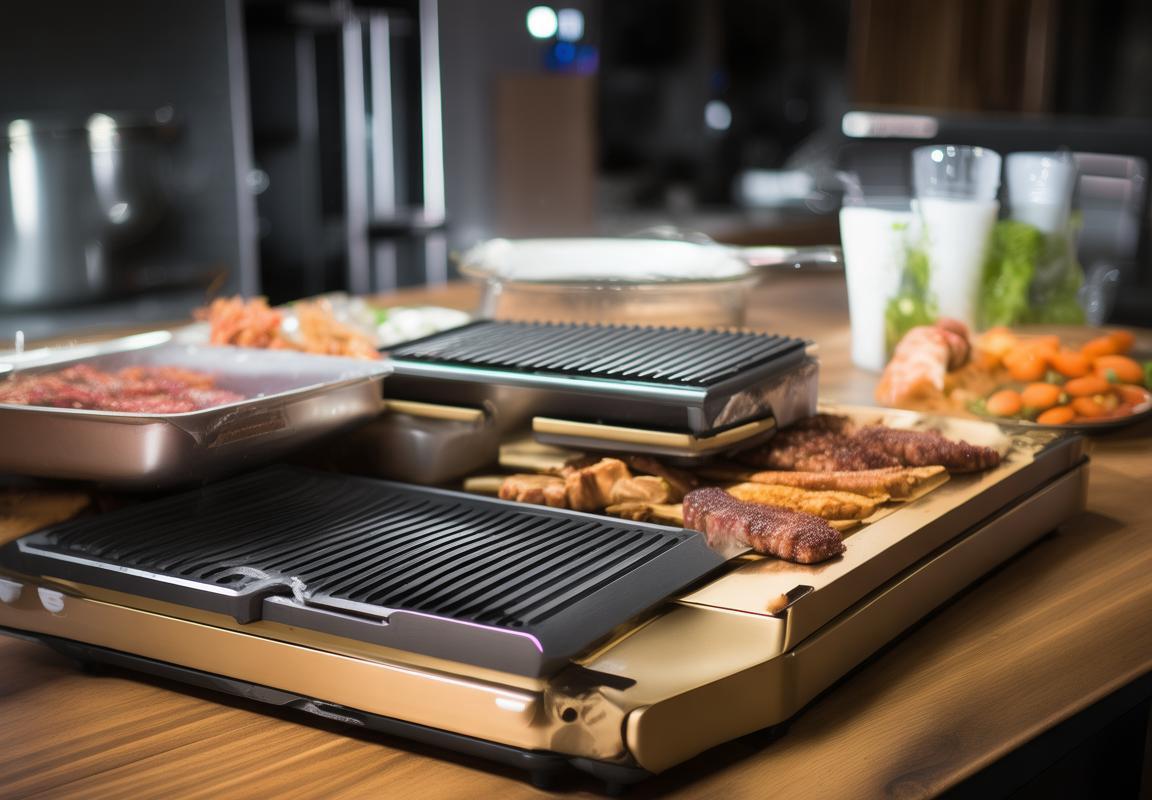
Understanding the Demand Drivers for Private Label Contact Grills
In the evolving landscape of the kitchen appliance market, private label contact grills have emerged as a significant segment, particularly in Europe and North America. This surge can be attributed to several key demand drivers that have shaped consumer preferences and purchasing behaviors.
One prominent driver is the increasing health consciousness among consumers. With a growing awareness of the nutritional content of food, many are seeking alternatives to traditional grilling methods that may involve added fats or oils. Private label contact grills, with their ability to cook food with minimal oil, have become an attractive option for those looking to maintain a healthier lifestyle.
Additionally, the convenience factor plays a crucial role. These grills are compact, easy to use, and often come with features that simplify the cooking process. Busy consumers, especially in urban areas, are gravitating towards private label grills that can provide a quick and hassle-free grilling experience without compromising on quality.
Cost-conscious consumers are also a driving force behind the popularity of private label contact grills. These products are typically priced lower than branded counterparts, making them more accessible to a wider market. The affordability of private label options has democratized the grilling experience, allowing more households to enjoy the benefits of contact grilling.
The trend towards home entertaining and outdoor living has further fueled demand. As people spend more time at home and seek ways to enhance their outdoor cooking capabilities, private label contact grills offer a versatile solution. They can be used on countertops, patios, or even in small kitchens, providing a convenient way to enjoy grilled meals without the need for a full-sized grill.
Another driver is the customization that private label brands offer. Many consumers appreciate the ability to choose specific features, designs, and even customization options that align with their personal preferences. This level of control allows customers to select a contact grill that not only fits their cooking needs but also complements their kitchen aesthetic.
The rise of e-commerce has also contributed to the growth of private label contact grills. Online retailers provide a vast array of options, making it easier for consumers to compare prices, read reviews, and make informed purchases. The convenience of shopping from home and the ease of returns have made private label grills more accessible and appealing.
Moreover, the emphasis on sustainability and eco-friendly products has influenced consumer choices. Private label brands often cater to these values by offering energy-efficient models and sustainable materials, which resonate with environmentally conscious consumers.
Marketing strategies have also played a part in the demand for private label contact grills. Effective branding and targeted marketing campaigns have highlighted the benefits of these products, making them more visible and appealing to potential buyers. The use of social media and influencer partnerships has further amplified their reach.
Lastly, the integration of smart technology in private label contact grills has opened up new avenues for consumer interest. Features like digital temperature control, wireless connectivity, and integrated apps have made these grills more sophisticated and user-friendly, appealing to tech-savvy consumers who seek advanced cooking capabilities.
In summary, the demand for private label contact grills in Europe and North America is driven by a combination of health and convenience factors, affordability, customization, the rise of e-commerce, sustainability concerns, effective marketing, and technological advancements. As these trends continue to shape consumer preferences, the private label segment is poised to maintain its growth trajectory in the kitchen appliance market.
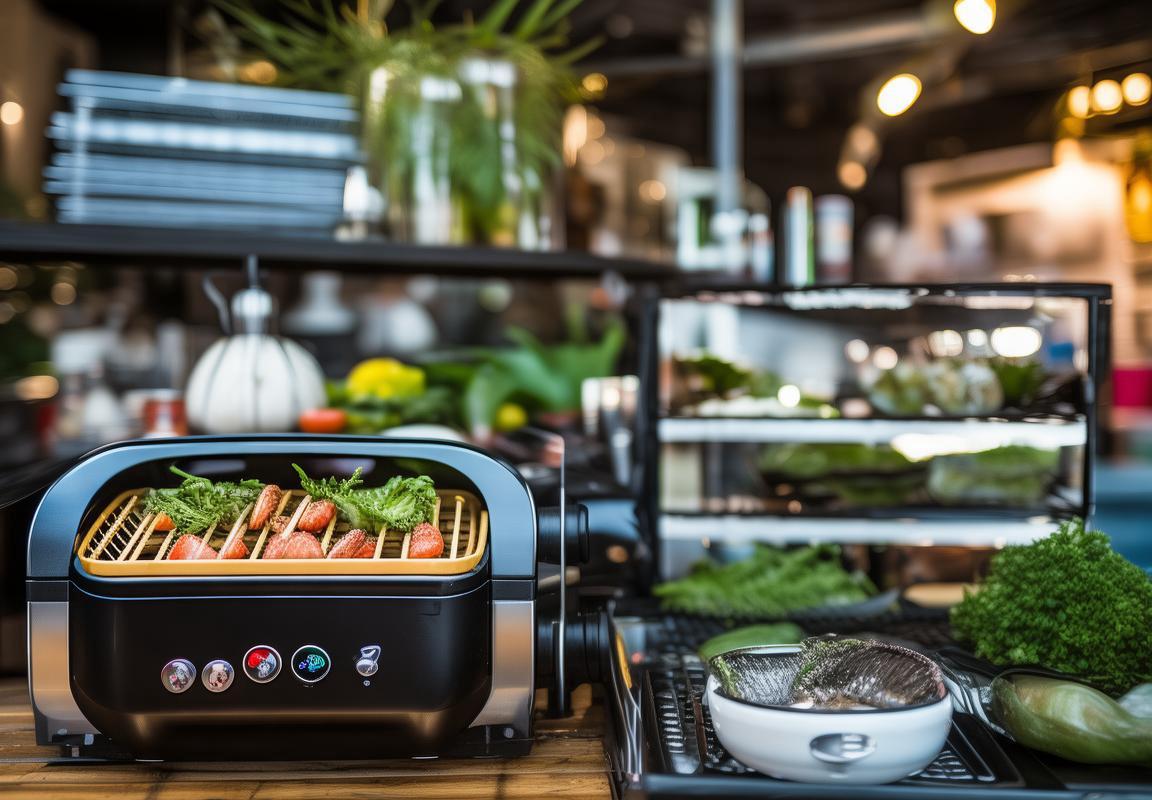
Key Features of Private Label Contact Grills
In the realm of private label contact grills, several key features have emerged as crucial in capturing the interest and loyalty of consumers. These features not only enhance the cooking experience but also contribute to the brand’s appeal in a competitive market.
-
Even Heat Distribution: One of the standout features of private label contact grills is their ability to distribute heat evenly across the cooking surface. This ensures that food is cooked uniformly, reducing the risk of burning and allowing for a perfect sear on both sides.
-
Non-Stick Coating: To make cleaning easier and to prevent food from sticking, many private label contact grills are equipped with a non-stick coating. This feature is particularly appealing to consumers who value convenience and ease of maintenance.
-
Versatile Cooking Surface: Private label contact grills often come with a reversible cooking surface, which can be flipped to accommodate different types of cooking. This dual-sided feature allows for grilling, searing, and even baking, making the appliance a versatile addition to any kitchen.
-
Temperature Control: A precise temperature control feature is a must-have in private label contact grills. Users can adjust the heat settings to suit their preferred cooking methods, whether it’s low and slow for delicate meats or high and fast for searing vegetables.
-
Easy-to-Use Design: The design of private label contact grills is often focused on simplicity and ease of use. Features like a straightforward control panel, intuitive buttons, and clear indicator lights make the cooking process straightforward for all skill levels.
-
Compact and Portable: Many private label contact grills are designed to be compact and portable, making them ideal for small kitchens or for those who enjoy outdoor cooking. The lightweight construction and foldable legs or handles contribute to their ease of transport and storage.
-
Safety Features: Safety is a top priority in the design of private label contact grills. This includes features like cool-touch handles, automatic shut-off mechanisms to prevent overheating, and child safety locks to prevent accidental use.
-
Energy Efficiency: Consumers are increasingly looking for energy-efficient appliances, and private label contact grills are not exempt from this trend. Many models are designed to be energy-efficient, saving both money and resources.
-
Additional Accessories: Some private label contact grills come with additional accessories that enhance their functionality. These might include grill plates, grids, and accessories for cooking specific types of food, such as kebabs or burgers.
-
Brand Identity: While the features of the grill itself are important, the brand’s identity also plays a role in what features are highlighted. Private label brands often focus on specific features that resonate with their target demographic, whether it’s health-conscious consumers looking for non-stick surfaces or families seeking durability and ease of use.
-
Innovation: The private label market is not immune to innovation. Brands are continuously introducing new features, such as adjustable sear marks, LED lighting for better visibility, and smart technology that allows for remote control and monitoring through a smartphone app.
-
Customer Service and Warranties: Lastly, the level of customer service and warranty offered by the private label brand can influence the perceived value of the contact grill. A robust warranty and accessible customer support can provide peace of mind to consumers.
These key features have become integral to the success of private label contact grills, offering consumers a wide range of benefits that cater to their diverse needs and preferences.
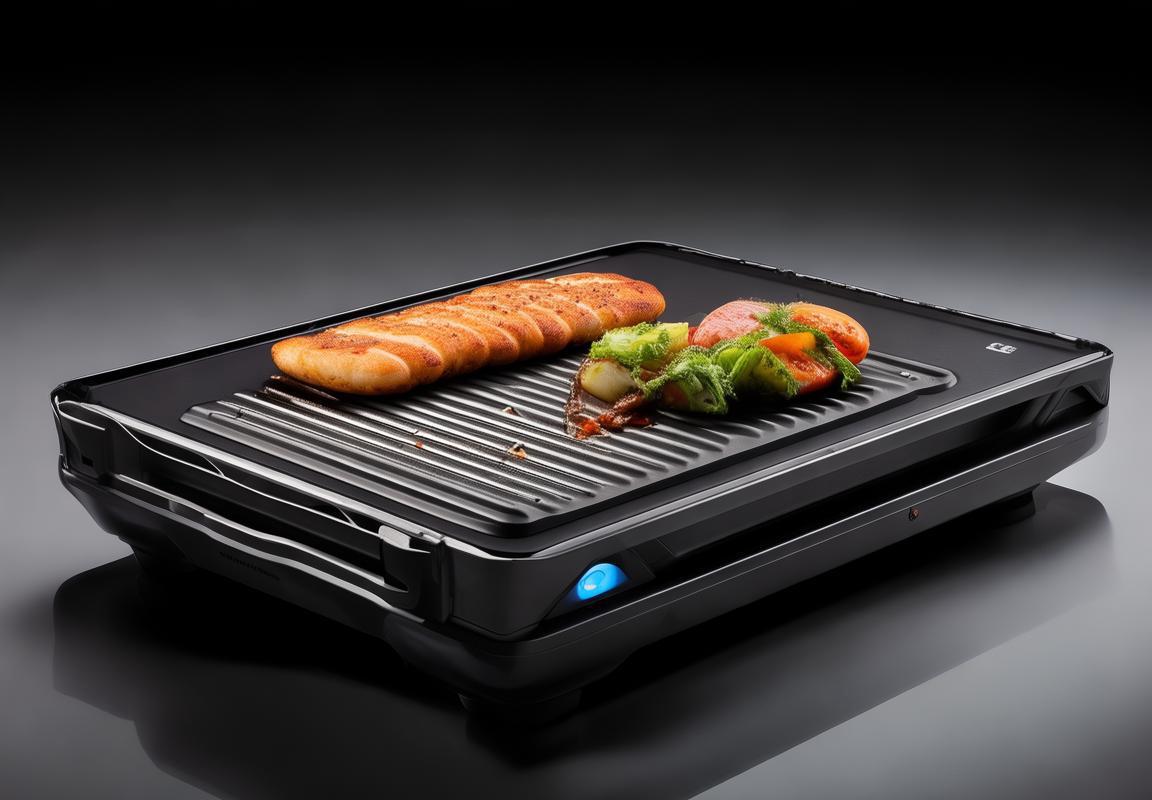
Competitive Landscape: Major Brands vs. Private Label Players
In the world of contact grills, the competitive landscape is shaped by both well-known brands and private label players, each vying for a share of the market with unique strategies and offerings.
Brands like George Foreman, Breville, and Cuisinart have long dominated the contact grill sector, with their products recognized for their durability and effectiveness. However, private label players have been gaining traction, often offering similar features at more accessible price points.
Private label contact grills are typically found in big-box stores, online marketplaces, and specialty kitchen stores. These brands, which include store-specific labels and regional players, have managed to carve out a niche by focusing on specific market segments or offering unique features that appeal to budget-conscious consumers.
One of the key advantages private label players have is the ability to quickly adapt to market trends. For instance, they can introduce new features such as adjustable heat settings or non-stick surfaces based on consumer feedback or emerging technologies. This agility allows them to compete directly with major brands in terms of innovation.
Despite the cost-effectiveness, private label contact grills often face challenges when it comes to brand recognition. Major brands have spent years building trust and loyalty, which can be a significant hurdle for private label players to overcome. However, they have managed to gain ground by leveraging strategic partnerships with retailers and through targeted marketing campaigns that highlight the value proposition of their products.
In terms of design, private label contact grills have evolved to match the aesthetic preferences of consumers. Many now feature sleek, modern designs that appeal to the style-conscious buyer. Moreover, these grills often come with intuitive interfaces, making them user-friendly for those who may not be as familiar with high-tech kitchen appliances.
When it comes to materials, private label grills have stepped up their game to compete with major brands. Many now use high-quality stainless steel for their cooking surfaces, ensuring even heat distribution and durability. Some even incorporate ceramic or non-stick coatings to prevent food from sticking and make cleanup easier.
One area where private label players have found success is in the customization of their products. They often offer a range of sizes and configurations, from compact models perfect for small kitchens to larger, more powerful units suitable for outdoor cooking. This variety caters to different consumer needs and preferences.
In terms of performance, private label contact grills have made strides in replicating the cooking experience of high-end brands. They now boast features such as adjustable temperature controls, which allow users to cook a variety of foods to perfection. Some models also include features like indicator lights that signal when the grill is at the optimal temperature for cooking.
Despite the advancements, private label grills still have to contend with the perceived quality and reliability associated with major brands. This perception is often based on decades of experience and innovation in the field. To bridge this gap, private label players have started to offer extended warranties and customer support services to build trust with their customers.
Another competitive strategy employed by private label players is the emphasis on sustainability. As consumers become more environmentally conscious, they are looking for appliances that are energy-efficient and have a minimal environmental footprint. Private label grills that tout their eco-friendly credentials are finding a receptive audience among environmentally conscious shoppers.
The competitive landscape is further influenced by the rise of online shopping, which has made it easier for private label players to reach a broader audience. With the ability to offer competitive pricing and ship directly to consumers, these brands are able to compete head-to-head with major brands without the constraints of traditional retail channels.
In conclusion, while major brands like George Foreman, Breville, and Cuisinart continue to hold a significant market share in the contact grill industry, private label players are making their mark by offering innovative, cost-effective solutions. Through strategic partnerships, targeted marketing, and a focus on consumer needs, these brands are carving out a niche and gaining ground in a highly competitive market.
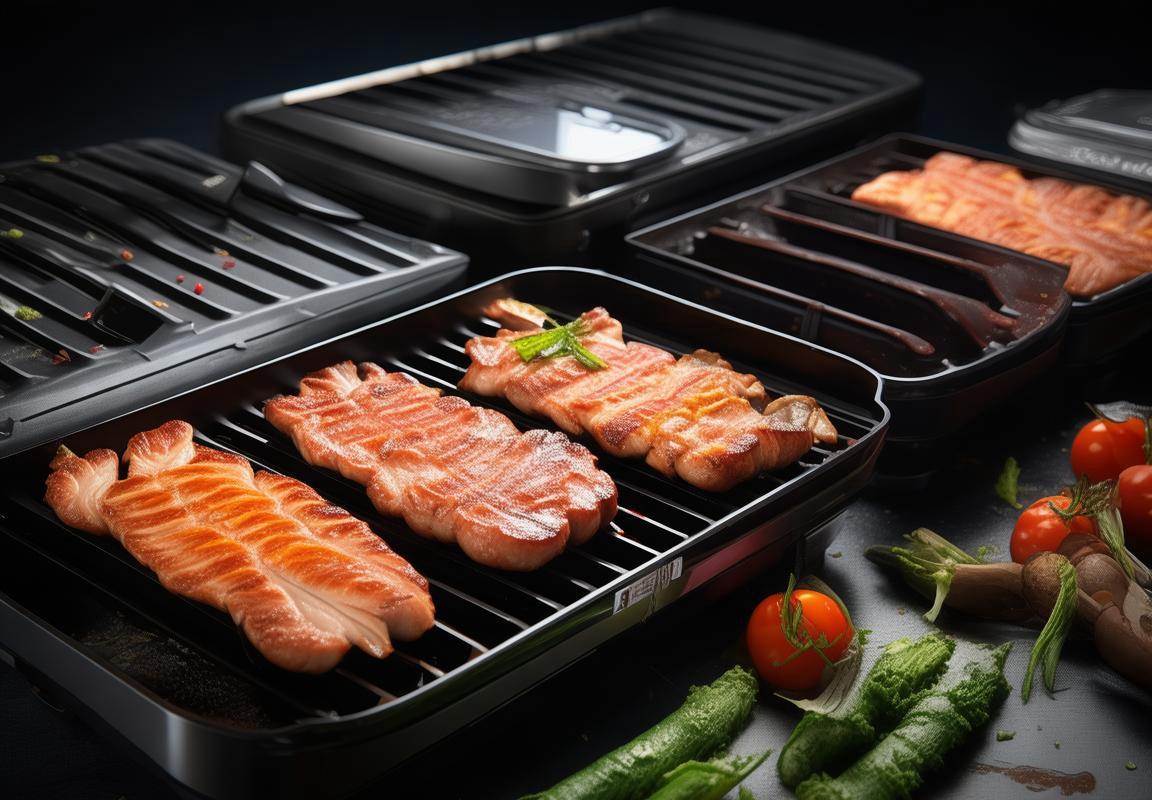
Distribution Channels: How Private Label Grills Reach the Consumer
In today’s competitive kitchen appliance market, private label contact grills have emerged as a significant force, challenging the dominance of major brand names. These grills, often offered under store-specific or retailer-branded labels, have gained traction for several compelling reasons. Let’s delve into the distribution channels that have enabled private label grills to reach the consumer.
Retailer-Owned Stores Play a Central RolePrivate label contact grills are prominently featured in the aisles of retailer-owned stores, where they often occupy prime real estate. These stores leverage their loyalty programs and customer base to promote their private label products, offering them at competitive prices compared to national brands. The familiarity of shoppers with these stores creates a trust factor that can boost sales.
E-commerce Platforms Have Become Key PlayersAs online shopping continues to rise, e-commerce platforms have become crucial channels for distributing private label contact grills. Retailers have their own websites and marketplaces like Amazon, eBay, and Walmart, where they showcase their private label products. This digital presence allows for wider market reach and the convenience of shopping from the comfort of home.
Collaborations with Department Stores and Electronics OutletsPrivate label grills are also found in department stores and electronics outlets, which cater to consumers looking for a variety of kitchen appliances. These partnerships provide a broader range of products to customers and often feature private label grills alongside other branded items, creating a shopping experience that’s both convenient and informative.
Specialty Stores Focus on Quality and ExperienceFor those consumers who prioritize quality and are willing to pay a premium, specialty stores have become a go-to destination for private label contact grills. These stores often offer personalized customer service and detailed demonstrations, which can help customers make informed purchasing decisions. The curated selection in these specialty stores highlights the premium features of private label grills.
Growth in Pop-Up Stores and MarketplacesThe rise of pop-up stores and temporary marketplaces has provided another avenue for private label grill manufacturers to reach consumers. These temporary shops can be set up in high-traffic areas, such as shopping centers or local events, offering an immediate and hands-on experience with the product. This approach is particularly effective for generating buzz and immediate sales.
Cross-Channel Marketing StrategiesRetailers are increasingly employing cross-channel marketing strategies to promote private label grills. This includes integrating online advertising with in-store displays, using social media to create awareness, and offering exclusive deals or promotions through email marketing. By using a mix of channels, retailers can engage consumers at various touchpoints, leading to increased sales.
Leveraging Social Media InfluencersSocial media influencers have become a powerful tool in the distribution of private label grills. By partnering with influencers who have a strong following, retailers can tap into their audience to showcase the benefits of their private label products. Influencers provide a personal touch to the marketing efforts, often sharing their own experiences with the grills, which can significantly influence consumer purchasing decisions.
Partnerships with Local Wholesalers and DistributorsTo expand their reach, private label grill manufacturers often collaborate with local wholesalers and distributors. These partnerships allow for a more localized approach to distribution, ensuring that products are available in areas where there might be a higher demand. Distributors can also offer valuable insights into regional preferences and market trends, helping to tailor the distribution strategy accordingly.
In-store Demonstrations and Sampling EventsIn-store demonstrations and sampling events are effective ways to engage consumers and encourage them to try private label contact grills. By allowing customers to experience the product firsthand, retailers can overcome any skepticism about the quality or performance of private label brands. These events can lead to immediate sales and also generate positive word-of-mouth referrals.
Seasonal Promotions and Clearance SalesPrivate label grill manufacturers and retailers often capitalize on seasonal promotions and clearance sales to boost sales. For example, summer months are prime time for grill sales, and retailers may offer special discounts or bundle deals to encourage purchases. Clearance sales of last year’s models can also drive traffic and sales without compromising on profits.
In conclusion, the distribution of private label contact grills is a multifaceted endeavor that involves a combination of traditional and innovative channels. By strategically navigating these channels, retailers and manufacturers can effectively reach consumers and build a strong market presence for their private label products.

Consumer Preferences and Market Feedback
The consumer landscape in the contact grill market is diverse and evolving, shaped by a range of preferences and market feedback that influences the direction of product development and marketing strategies. Understanding these factors is crucial for private label players to compete effectively.
Grill features that resonate with consumers often include convenience, ease of use, and health benefits. Many consumers appreciate contact grills for their ability to sear food evenly, which not only adds flavor but also locks in nutrients. The demand for non-stick surfaces has grown, as consumers seek to minimize the use of oil and avoid messy cleanups.
One notable trend is the preference for adjustable heat settings, allowing users to control the cooking temperature based on the type of food being prepared. This feature is particularly appealing to health-conscious consumers who want to manage their calorie intake. Additionally, there’s a growing trend towards grills that can be used as sandwich makers or to prepare other types of meals, offering versatility that appeals to busy families and individuals.
Market feedback suggests that consumers value durability and longevity in their appliances. The lifespan of a contact grill can be a significant factor in purchase decisions, with many consumers looking for a product that can withstand daily use and maintain its performance over time.
Another important aspect is the aesthetic appeal of the grill. Consumers are drawn to sleek designs and modern aesthetics, which can enhance the look of a kitchen and align with their personal style. The color options and materials used in the construction of private label grills can greatly influence their appeal.
In terms of price sensitivity, there is a wide spectrum of consumer reactions. Some shoppers are price-conscious and actively seek out the most affordable options, while others are willing to invest in higher-quality private label grills that offer premium features and performance. Market feedback indicates that transparent pricing and value for money are critical in convincing consumers to make a purchase.
Health and safety are also at the forefront of consumer concerns. Grills with non-toxic materials and easy-to-clean components are preferred. Additionally, safety certifications and clear instructions on usage and maintenance can positively influence consumer purchasing decisions.
Customization is another area where consumer preferences are evident. Some consumers enjoy the ability to personalize their grill with additional attachments or accessories, such as grill mats, different-sized cooking surfaces, or even digital interfaces for enhanced control. The ability to adapt the grill to individual preferences or needs can be a strong selling point.
Lastly, social influence plays a role in consumer preferences. Positive reviews, recommendations from friends and family, and influencer endorsements can greatly sway the decision-making process. Consumers are often looking for reassurance that they are purchasing a product that has been well-received by others.
The combination of these preferences and feedback from the market provides private label players with valuable insights into how they can differentiate their products, improve customer satisfaction, and ultimately drive sales. By staying attuned to these evolving consumer trends, private label brands can continue to meet the demands of a dynamic market.
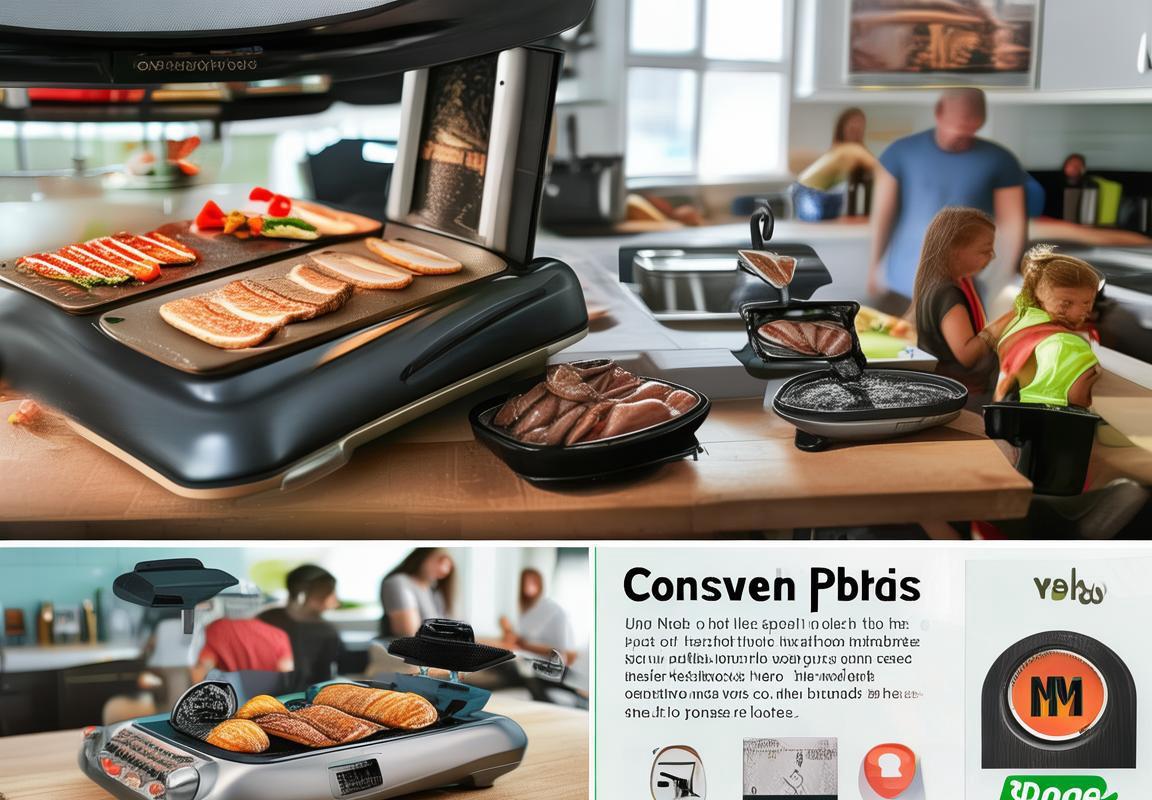
Innovations in Private Label Contact Grill Technology
The evolution of private label contact grill technology has been marked by a series of innovations that have not only enhanced the cooking experience but also expanded the appeal of these appliances to a broader consumer base. From enhanced heat distribution to smart features, here’s a closer look at the technological advancements shaping the private label contact grill market.
Grill Surface AdvancementsPrivate label contact grills have seen significant improvements in their grill surfaces. Traditional flat surfaces have been replaced by textured surfaces that offer better sear marks and prevent food from sticking. These advancements are particularly appealing to consumers who value the aesthetic appeal of grill marks on their food.
Heat Distribution SystemsEfficient heat distribution is crucial for even cooking. Private label manufacturers have invested in technology that ensures consistent heat across the grill surface. Features like adjustable heat settings and ceramic coatings have become standard, allowing users to control the cooking temperature and achieve perfect results every time.
Smart Cooking FunctionsThe integration of smart technology into contact grills has been a game-changer. Many private label models now come with features like temperature control, timers, and even wireless connectivity. These smart functions allow users to monitor and adjust their cooking process remotely, providing convenience and peace of mind.
Non-Stick CoatingsThe search for non-stick surfaces continues to be a priority in private label contact grill technology. Advances in non-stick coatings have made it possible to cook a wide variety of foods without the worry of food sticking to the grill. This is particularly beneficial for those who prefer a healthier cooking option, as it reduces the need for excessive oil.
Safety FeaturesSafety is a top concern for consumers, and private label contact grills have responded with a range of safety features. These include cool-to-the-touch handles, automatic shut-off functions, and safety locks to prevent accidental operation. These features not only protect users but also give them confidence in the product’s reliability.
Eco-Friendly MaterialsSustainability is a growing concern, and private label contact grill manufacturers are responding by using eco-friendly materials. From recyclable packaging to appliances made with sustainable materials, these innovations cater to environmentally conscious consumers who want to reduce their carbon footprint.
Cooking Efficiency and Time SavingsEfficiency is a key driver in the private label contact grill market. Innovations such as rapid preheating and multi-functional cooking surfaces that can handle a variety of foods at once have made these grills more appealing. Consumers appreciate the time saved and the ability to cook a variety of dishes with a single appliance.
Customizable Cooking OptionsPrivate label contact grills are now offering customizable cooking options that cater to different dietary preferences. From vegan-friendly to gluten-free, these appliances provide a versatile cooking experience that appeals to a diverse range of consumers.
Maintenance and CleaningEase of maintenance and cleaning is another area where private label contact grill technology has seen improvements. Features like removable and dishwasher-safe parts, along with self-cleaning modes, make it easier for users to keep their grills in top condition.
Integration with Smart Home SystemsThe latest trend in private label contact grill technology is the integration with smart home systems. Users can now control their grills through voice commands or smartphone apps, making the cooking experience even more seamless and interactive.
In conclusion, the innovations in private label contact grill technology have transformed the way consumers cook at home. From improved cooking performance to enhanced safety and smart features, these advancements continue to drive the popularity of private label contact grills among consumers seeking high-quality, versatile, and user-friendly cooking solutions.
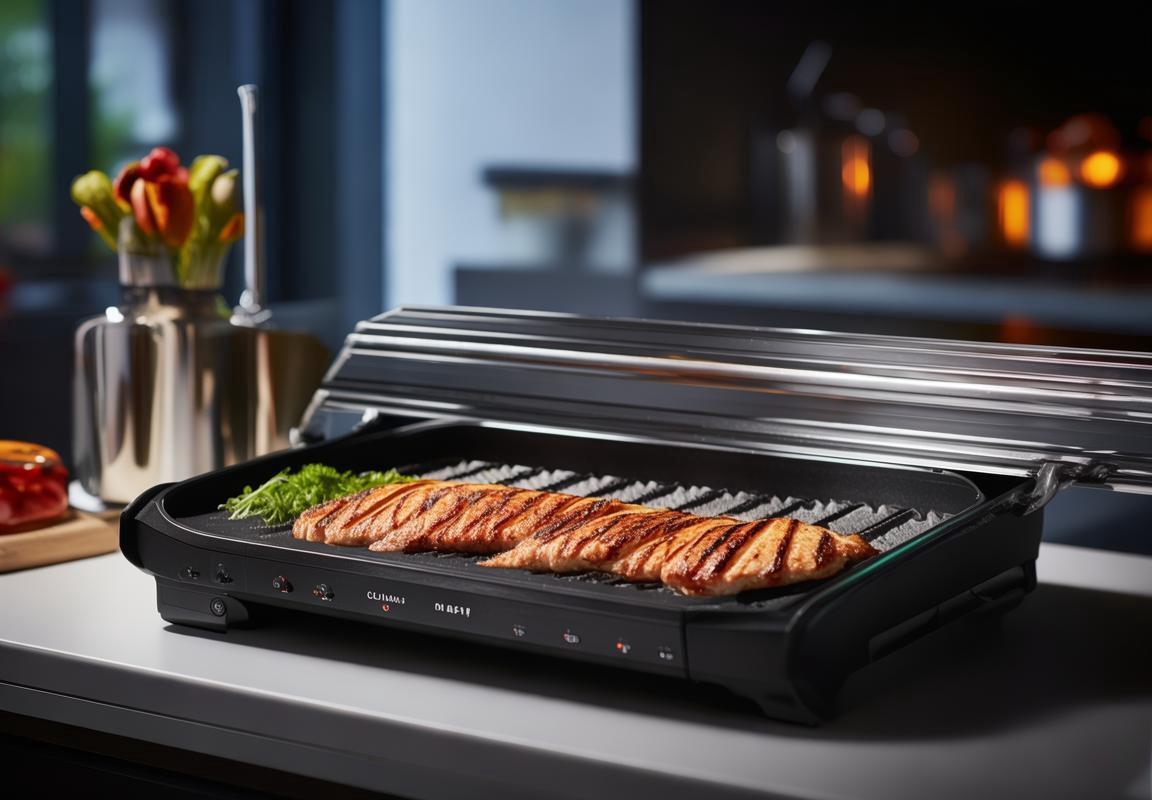
Challenges and Opportunities for Private Label Manufacturers
In the competitive landscape of the kitchen appliance industry, private label manufacturers face a unique set of challenges and opportunities. Balancing the need to offer affordable, quality products with the desire to differentiate from major brands is a delicate dance. Here’s a closer look at the intricacies of this dynamic:
Private label manufacturers must navigate a complex web of consumer expectations, market trends, and operational hurdles. One challenge lies in the pressure to keep costs low while maintaining product quality. This often requires a strategic sourcing approach, where suppliers are chosen not just for their prices but also for their ability to deliver consistent, high-quality components.
Another challenge is the need to stay abreast of technological advancements. As consumers become more tech-savvy, they demand features that enhance convenience, efficiency, and safety. Private label brands must invest in research and development to keep their products competitive, which can be a significant financial burden.
On the flip side, there are numerous opportunities for private label manufacturers. One such opportunity is the ability to tailor products to specific market segments. By understanding the nuances of different consumer groups, private label brands can create products that resonate with niche markets, potentially commanding higher profit margins.
Additionally, private label manufacturers can leverage the flexibility and agility of their business models to quickly respond to market changes. This agility allows them to capitalize on emerging trends and consumer demands more rapidly than larger, established brands.
The rise of e-commerce has also opened up new opportunities for private label brands. Online platforms provide direct access to consumers, reducing reliance on traditional retail channels. This direct-to-consumer approach not only cuts costs but also allows for direct feedback and a more personalized shopping experience.
However, with these opportunities come challenges. Private label brands must navigate the complex world of digital marketing, ensuring their online presence is robust and their messaging is clear and compelling. They also need to manage customer service and logistics efficiently to maintain a strong online reputation.
Another challenge is the risk of product proliferation. With so many products available, consumers can become overwhelmed, making it harder for private label brands to stand out. This requires a focused marketing strategy that highlights unique selling propositions (USPs) and differentiators.
Moreover, private label manufacturers must grapple with the challenge of brand perception. While private label products are often perceived as lower quality or less prestigious than branded alternatives, there is a growing segment of consumers who prioritize value and functionality over brand name. This shift in consumer mindset presents an opportunity for private label brands to redefine their value proposition and appeal to a broader market.
From a supply chain perspective, private label manufacturers must manage the complexities of global sourcing. This includes dealing with currency fluctuations, trade policies, and logistical challenges. Despite these challenges, the ability to offer competitive pricing and a wide range of products can be a significant draw for consumers looking for budget-friendly kitchen appliances.
In the realm of sustainability, private label manufacturers have the chance to differentiate themselves by offering eco-friendly products. As consumers become more environmentally conscious, the demand for sustainable and energy-efficient appliances is on the rise. This presents an opportunity to not only align with consumer values but also to appeal to those who are willing to pay a premium for green products.
Lastly, the opportunity to innovate lies in the realm of smart kitchen technology. As the Internet of Things (IoT) continues to evolve, private label brands can develop appliances that integrate seamlessly with smart home systems. This not only enhances the user experience but also opens up new revenue streams through software updates and subscription services.
In conclusion, while private label manufacturers face a myriad of challenges, they also have a wealth of opportunities to capitalize on. By focusing on quality, innovation, and consumer needs, these brands can carve out a niche in the competitive kitchen appliance market. The key lies in understanding the balance between cost-effectiveness and differentiation, and leveraging the strengths of their business models to meet the ever-changing demands of the consumer landscape.

Future Outlook: Predictions for the Private Label Contact Grill Market
The private label contact grill market is witnessing a surge in demand, driven by a variety of factors that are reshaping consumer preferences and market dynamics. Understanding these drivers is crucial for both manufacturers and retailers looking to capitalize on this growing segment.
Consumers are increasingly seeking value-for-money options that offer quality without the premium price tag associated with branded products. Private label contact grills provide a compelling alternative, offering affordability without compromising on performance. This trend is particularly pronounced in regions like Europe and North America, where consumers are budget-conscious and value-driven.
Eco-consciousness is another significant driver. Many consumers are looking for greener alternatives to traditional grilling methods, which can be more environmentally damaging due to the use of gas or charcoal. Private label contact grills often come with features that appeal to eco-friendly shoppers, such as energy-efficient designs and recyclable materials.
The convenience factor cannot be overstated. Private label contact grills are often designed with ease of use in mind, featuring non-stick surfaces, adjustable temperature controls, and easy-to-clean components. These features resonate with busy consumers who appreciate a product that simplifies their cooking routine.
Safety is also a key driver, especially in the wake of health concerns that have made people more cautious about food preparation. Private label grills that emphasize safety features, like even heat distribution and temperature alerts, are likely to gain a loyal customer base.
When it comes to the features of private label contact grills, there are several standout elements that set them apart:
-
Even Heat Distribution: Many private label grills are engineered to ensure consistent heat across the cooking surface, preventing hot spots and ensuring food is cooked evenly.
-
Non-Stick Surfaces: These surfaces make cleaning easier and reduce the need for additional fats or oils, which is a win for both the consumer and the environment.
-
Adjustable Temperature Controls: Users can set the grill to their desired temperature, making it versatile for various types of food and cooking styles.
-
User-Friendly Design: Private label grills often come with features that make them easy to handle, such as soft-grip handles and simple-to-read control panels.
-
Eco-Friendly Materials: Some private label grills are made with sustainable materials, appealing to environmentally conscious consumers.
The competitive landscape in the private label contact grill market is multifaceted, with major brands and private label players each bringing their unique strengths to the table.
Major brands benefit from established brand recognition and customer loyalty, which can be challenging for private label manufacturers to match. However, they may struggle with higher production costs and less flexibility in responding to market trends quickly.
Private label players, on the other hand, offer cost advantages and the ability to adapt products to changing consumer demands. They often focus on innovation and value-added features that can differentiate their products from major brands.
Distribution channels play a pivotal role in how private label grills reach the consumer. Here are some key aspects of this distribution landscape:
-
Supermarkets and Hypermarkets: These are primary outlets for private label products, offering a broad customer base and convenient shopping experiences.
-
Online Retailers: The rise of e-commerce has opened new avenues for private label grills, allowing manufacturers to reach customers directly and offer a wider range of products.
-
Specialty Stores: Some private label grills find their niche in specialty stores that cater to specific consumer interests, such as outdoor living or eco-conscious shoppers.
-
Direct-to-Consumer: With the rise of DTC (Direct-to-Consumer) models, some private label manufacturers are choosing to sell their products directly to consumers, often leveraging social media and online marketing.
Consumer preferences and market feedback are constantly evolving, reflecting changing trends and consumer needs. Here’s a closer look at these dynamics:
-
Quality and Reliability: Consumers prioritize quality and reliability, expecting private label grills to perform as well as their branded counterparts.
-
Design and Aesthetics: Appearance matters, and private label grills are increasingly being designed with a focus on aesthetics to appeal to style-conscious consumers.
-
Value for Money: Affordability is a key factor, but consumers also expect private label products to offer good value for their money.
-
Health and Safety: There is a growing emphasis on health and safety, with consumers looking for products that minimize the risk of foodborne illnesses.
Innovation in private label contact grill technology is a key driver of market growth. Here are some of the latest technological advancements:
-
Smart Technology: Some private label grills now come with smart features, such as Bluetooth connectivity, allowing users to control the grill remotely via a smartphone app.
-
Advanced Heat Sensors: These sensors ensure precise temperature control, reducing the risk of overcooking or undercooking food.
-
Self-Cleaning Functions: Some models now offer self-cleaning capabilities, making maintenance easier and more convenient for consumers.
-
Energy Efficiency: Innovations in energy efficiency are making private label grills more sustainable and cost-effective to operate.
Challenges and opportunities for private label manufacturers are intertwined, with each presenting unique considerations:
-
Challenges:
-
Brand Recognition: Building brand recognition can be difficult for private label manufacturers, especially when competing against established brands.
-
Quality Control: Ensuring consistent quality across a range of products can be challenging, particularly as the product line expands.
-
Market Saturation: With more private label options available, standing out in a crowded market can be a challenge.
-
Opportunities:
-
Customization: Private label manufacturers can offer customized solutions that meet specific consumer needs, giving them a competitive edge.
-
Collaboration: Partnering with retailers to co-develop products can help private label manufacturers stay ahead of market trends.
-
Innovation: Continuous innovation in design and technology can differentiate private label products and attract new customers.
Looking ahead, the future outlook for the private label contact grill market is promising. Predictions indicate several key trends:
- Expansion into New Markets: There is potential for growth in emerging markets, where the demand for affordable cooking appliances is high.
- Increased Focus on Sustainability: As consumers become more environmentally conscious, private label grills with sustainable features are likely to gain traction.
- Technological Integration: The integration of smart technology and innovative features is expected to drive market growth, as consumers seek convenience and efficiency.
- Health and Wellness: As health and wellness trends continue to rise, private label grills offering healthier cooking options may see increased demand.
The private label contact grill market is poised for continued growth, with a focus on innovation, value, and meeting the evolving needs of consumers.